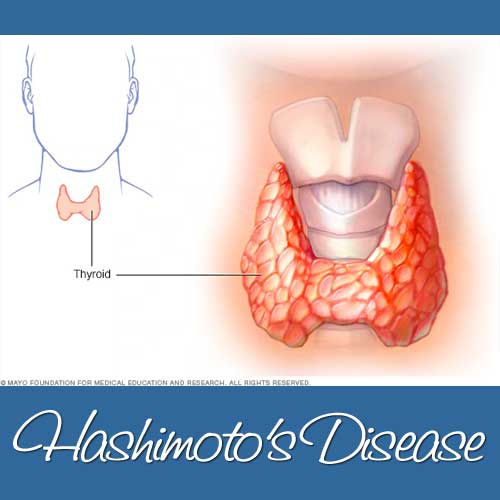Hashimoto’s Disease is an autoimmune disorder where your immune system creates antibodies that damage your thyroid gland. The inflammation that is caused is called chronic lymphocytic thyroiditis and often leads to a person having an under-active thyroid gland. Often it is hard to notice the symptoms of Hashimoto’s Disease until there is more severe damage to the thyroid.
Our thyroid gland is located at the base our neck, in the front of our throat. It is about 2 inches long and has a butterfly-shape. This organ is part of our endocrine system. Its job is to make, store and release hormones that affect many parts of our body.
Functions the Thyroid Regulate:
- Breathing
- Heart rate
- Central and peripheral nervous systems (Brain and spinal cord and the nerves that connect the rest of our body to our brain and spinal cord)
- Body weight
- Muscle strength
- Menstrual cycles
- Body temperature
- Cholesterol levels
When the thyroid is not working properly we see symptoms that affect our every day life because it affects how our body uses energy. Hypothyroidism is a situation where the thyroid does not create enough of specific hormones called triiodothyronine (T3) and thyroxine (T4). This unbalance in our hormones cause symptoms like weight gain and fatigue.
Symptoms of Hashimoto’s Disease:
- Fatigue and sluggishness
- Increased sensitivity to cold
- Constipation
- Pale, dry skin
- A puffy face
- Brittle nails
- Hair loss
- Enlargement of the tongue
- Unexplained weight gain
- Muscle aches, tenderness and stiffness
- Joint pain and stiffness
- Muscle weakness
- Excessive or prolonged menstrual bleeding
- Depression
- Memory lapses
Doctors don’t really know what causes Hashimoto’s Disease although some scientists believe that it may be caused by a virus or bacteria that might trigger a response in the immune system. Other scientists believe that it may be caused by a genetic flaw.
Who is Most Likely to be Diagnosed with Hashimoto’s Disease:
- Women are more likely than men to get Hashimoto’s Disease
- Hashimoto’s generally affects middle aged people, although it can occur at any age
- People related to someone with Hashimoto’s
- People who have other autoimmune diseases
- People that have experienced excessive levels of environmental radiation (including medical treatments and therapies)
- People that have had thyroid surgery
Untreated Hashimoto’s Disease or hypothyroidism can lead to other health problems so being proactive is very important.
Untreated Hashimoto’s Disease Complications:
- Goiter: enlarged thyroid gland that can affect your appearance and interfere with swallowing and breathing
- Heart problems: under-active thyroid can cause high cholesterol, heart disease, enlarged heart or heart failure
- Mental health issues: Depression and slowed mental functioning
- Myxedema: drowsiness and profound lethargy and unconsciousness
- Lowered sexual desire
- Birth defects or Infertility
- Peripheral neuropathy: pain, numbness and tingling in areas with damaged peripheral nerves
The Wellness Works NW Team wants you to be your best version of you. We want to encourage you to make an appointment to see your primary medical professional if you are experiencing any of the symptoms of Hashimoto’s Disease. Hormone and Antibody tests can confirm whether you have Hashimoto’s or other autoimmune diseases and these tests are simple blood tests. Hashimoto’s Disease is treated with synthetic hormones that require doctors to help you find the correct amount, which will change over time. Autoimmune Disease is a chronic illness that does not go away but with proper medicine and lifestyle changes you can live well with Hashimoto’s Disease.
We know people with Hashimoto’s Disease, who thrive with a vegan diet and proper rest, movement and relaxation. If you are needing help creating a Wellness Plan that works for you, please Contact Wellness Works NW at 360-447-8061. Karen G Clemenson is a very caring and authentic person and she is looking forward to talking with you and helping you define your Wellness Goals and strategies.
I hope this article answered questions you had and was easy to understand. If you would like us to write about a particular topic that you can’t find on this site, please send us an email on our Dear Jamie page and someone from Our Team will be glad to research and write about your topic.
Read More at:
- Difference between bacterial and viral infection by HealthDirect Staff
- Image Credit: Hashimoto’s disease by Mayo Clinic Staff
- Hypothyroidism (underactive thyroid) by Mayo Clinic Staff
- Peripheral nervous system by The University of Queensland Australia Staff
- Thyroid Gland: Overview by Bridget Brady, MD, FACS for EndocrineWeb
Related Articles
- Learning About Celiac Disease
- Learning About Generalized Anxiety Disorder
- Learning About Ketoacidosis
- Fat Cells 405: Fat Cells and Eating Disorders
- How to Thrive with Chronic Pain
I hope this article helps Fuel Your Wellness. Please leave your comments below.
 Summer D Clemenson is a co-owner Clemenson Enterprises, LLC and Wellness Works NW. Summer her wife, Karen G Clemenson’s personal motto is Creativity, Honesty & Positivity are a must! This mantra helps them stay community and wellness minded in all they do. Summer is an Independent Wellness Advocate at dōTERRA. Summer also writes poetry and inspirational blogs @ GoodTimesAlways.com. Her crochet art can be viewed and purchased @ KnottyWares.com & she loves special orders!
Summer D Clemenson is a co-owner Clemenson Enterprises, LLC and Wellness Works NW. Summer her wife, Karen G Clemenson’s personal motto is Creativity, Honesty & Positivity are a must! This mantra helps them stay community and wellness minded in all they do. Summer is an Independent Wellness Advocate at dōTERRA. Summer also writes poetry and inspirational blogs @ GoodTimesAlways.com. Her crochet art can be viewed and purchased @ KnottyWares.com & she loves special orders!













